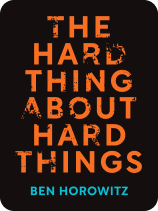

This article is an excerpt from the Shortform book guide to "The Hard Thing About Hard Things" by Ben Horowitz. Shortform has the world's best summaries and analyses of books you should be reading.
Like this article? Sign up for a free trial here .
Do you own a company and are considering hiring an exectutive? How do you know when you should hire from within or find an external applicant? What kind of questions should you ask during the interview?
When your startup grows and you find yourself in need of an executive, the first step is to decide whether you should hire from within or externally. The next step is the hiring process and determining who is the best fit.
Keep reading for advice on the executive hiring process.
When to Hire an Executive
When you’re a startup, you may prefer executive hiring process that promote people from within.
So why hire senior executives at all? To move faster. They know how to do things that your company doesn’t know right now, and bringing in outside knowledge will help your team learn faster and grow more quickly.
- For example, if you’re a product and engineering-focused team, no one on the team may know how to build a dominant sales force. While you can experiment and learn internally, an incoming VP of sales can accelerate the strategy far faster.
For any senior executive, consider how much of their job requires inside knowledge vs. outside knowledge. This will influence whether you should promote from within or hire from outside.
- An engineering manager needs to understand your proprietary codebase, and this is more important and difficult than learning how to run an engineering team. It’s likely better to promote this person from within.
- An enterprise sales manager needs to understand how to build a sales process and a sales team, how to run both with discipline, and how to target the right people in the target buyer. With this framework, they can sell virtually any product. It’s likely better to hire this person from outside.
The Executive Hiring Process
Here’s a process for hiring executives:
- Understand the job requirements well. Interview domain experts and learn what makes them successful. Even better, do the job yourself. Be the acting VP of whatever department you’re hiring for. You may be scared that you know nothing about the role, but that’s exactly why you need to learn it.
- Make a list of job requirements. What strengths are you looking for? What weaknesses can you tolerate? Note that different positions need different skills—a VP of sales may need to be a disciplined team manager, while a CFO may not.
- Write questions that test for these requirements. Write good answers to those questions. We’ll cover examples for a VP of sales below.
- Assemble an interview team. This should consist of two groups of people: 1) people who can assess the candidate’s functional performance, 2) people who can assess the candidate’s fit after joining. You can include people within or outside the company, including domain experts and board members.
- Assign questions to each member of the team based on how well they can distinguish good vs. bad answers.
- Review the interview with each interviewer. You can verify that the interviewer understands the criteria and how to grade the candidate.
- Call references yourself. Beyond taking their evaluation, ask questions that will test against your hiring requirements.
- Make the final decision yourself. Only you have the global view of the hiring requirements, the company’s needs, and the interview team’s scoring. Do not hire by committee.
Hiring Executives from Big Companies
Executives at big companies and executives at startups have very different working styles.
In big companies, executives have lots of demands on their time, from departments they manage, to colleagues who want help, to customers and partners who want attention. Thus, big company executives are great at prioritizing, improving processes, and designing organizations. They don’t need to create as much as they need to filter, triage, and optimize.
In startups, nothing gets done until you do it. No one wants your attention, and the ball doesn’t move forward unless you push it. Therefore, startup executives need to be able to do the functional work well, know how to build a team from scratch, and know how to build processes from scratch. Startup executives need to create new directions themselves and push them forward.
Therefore, a big company executive might be a poor fit for a startup. He might land in your company and sit around waiting for things to happen. Then nothing gets done, and people resent his high compensation.
This isn’t a total dismissal of all big company execs. You just need to be careful when hiring them and when onboarding them.
When interviewing a big company exec, ask questions that indicate awareness of the difference in job needs:
- “What will you do in your first month?” Look for people who have lots of initiatives they want to push forward. Beware of people who expect to inherit a list of ideas they just need to pick from.
- “How will your previous work differ from work at our company?” Look for people who are aware of the differences in work style and pacing. Beware of people who think the jobs are identical.
- “Why do you want to move from a big company to a small company?” Look for people who want to create things for themselves rather than merely oversee the creation. Beware of people who have narrow wants, like equity.
When you hire a big company exec, onboard them well to increase their chances of integrating:
- Make them learn about everything—your company, your product, the market, your competitors. Ask them to bring questions on a daily basis that you can answer. If they have no questions, consider firing them.
- Make connections for them. Prepare a list of people they should contact in their first week or month, and ask for a report on what they learned in each meeting.
- Make them create. Give them monthly, even daily objectives to ensure they’re not waiting for things to happen.
Example Questions for VP of Sales
The questions here are framed as questions for the interviewer to score the candidate on, but they can be adapted to be questions posed to the candidate directly.
Job Function Questions
- Sales fundamentals: Does she know our company and product, our market, and our competition? Does she understand the difference between transactional reps and enterprise reps?
- Sales process: Does she understand the components of a process (CRM, sales collateral, demos)? Can she develop her own sales process, or does she just run an existing one?
- Hiring salespeople: How does she design her interview process? How does she find top candidates?
- Sales training: How does she train people to execute the sales process? Does she have her own training materials?
- Sales management: How does she enforce the sales process? How would she set up a compensation plan (spiffs, accelerators)?
Management Skill Questions
- Managing direct reports: How does she evaluate her people? How does she train them and continue to improve them? How does she promote people or fire people?
- Making decisions: How does she go about making decisions? How does she gather information?
- Strategy: How does she plan strategy? How does she communicate this to the team?
- Metrics: How does she decide what metrics to focus on? What are the side effects of focusing on these metrics?
- Organizational design: How would she design her organization? Why?
General Ability Questions
- Intelligence: How quickly does she “get it”? Beyond her immediate job, can she help with overall company strategy?
- Motivation: Does she have the right motivations to join our company?
- Integrity: Is she honest or bullshitty?
- Culture: Would I be happy working for her?

———End of Preview———
Like what you just read? Read the rest of the world's best book summary and analysis of Ben Horowitz's "The Hard Thing About Hard Things" at Shortform .
Here's what you'll find in our full The Hard Thing About Hard Things summary :
- What it was like to head a company through the dotcom bubble and subsequent burst
- Why failing is normal
- How to build a good place to work






